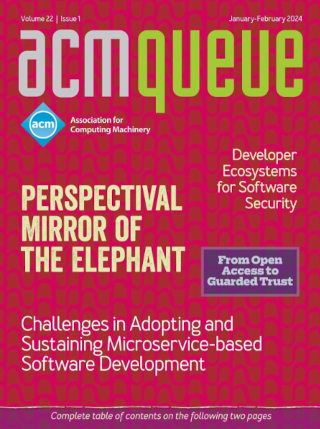What do Trains, Horses, and Home Internet Installation have in Common?:
Avoid changes mid-process
At first, I thought he was just trying to shirk his responsibilities and pass the buck on to someone else. His advice, however, made a lot of sense. The installation team probably generated configurations ahead of time, planned out how and when those changes need to be activated, and so on. The entire day is planned ahead. Bureaucracies usually have a happy path that works well, and any deviation requires who knows what? Managers getting involved? Error-prone manual steps? Ad hoc database queries? There's no way I could know.
Master of Tickets:
Valuing the quality, not the quantity, of work
Many silly metrics have been created to measure work, including the rate at which tickets are closed, the number of lines of code a programmer writes in a day, and the number of words an author can compose in an hour. All of these measures have one thing in common: They fail to take into account the quality of the output. If Alice writes 1,000 lines of impossible-to-read, buggy code in a day and Carol writes 100 lines of well-crafted, easy-to-use code in the same time, then who should be rewarded?
The Observer Effect:
Finding the balance between zero and maximum
The problem is a failure to appreciate just what you are asking a system to do when polling it for information. Modern systems contain thousands of values that can be measured and recorded. Blindly retrieving whatever it is that might be exposed by the system is bad enough, but asking for it with a high-frequency poll is much worse.
The Small Batches Principle:
Reducing waste, encouraging experimentation, and making everyone happy
The small batches principle is part of the DevOps methodology. It comes from the lean manufacturing movement, which is often called just-in-time manufacturing. It can be applied to just about any kind of process. It also enables the MVP (minimum viable product) methodology, which involves launching a small version of a service to get early feedback that informs the decisions made later in the project.
How Sysadmins Devalue Themselves:
And how to track on-call coverage
Q: Dear Tom, How can I devalue my work? Lately I’ve felt like everyone appreciates me, and, in fact, I’m overpaid and underutilized. Could you help me devalue myself at work? A: Dear Reader, Absolutely! I know what a pain it is to lug home those big paychecks. It’s so distracting to have people constantly patting you on the back. Ouch! Plus, popularity leads to dates with famous musicians and movie stars. (Just ask someone like Taylor Swift or Leonardo DiCaprio.) Who wants that kind of distraction when there’s a perfectly good video game to be played?
Advances and Challenges in Log Analysis:
Logs contain a wealth of information for help in managing systems.
Computer-system logs provide a glimpse into the states of a running system. Instrumentation occasionally generates short messages that are collected in a system-specific log. The content and format of logs can vary widely from one system to another and even among components within a system. A printer driver might generate messages indicating that it had trouble communicating with the printer, while a Web server might record which pages were requested and when.
Testable System Administration:
Models of indeterminism are changing IT management.
The methods of system administration have changed little in the past 20 years. While core IT technologies have improved in a multitude of ways, for many if not most organizations system administration is still based on production-line build logistics (aka provisioning) and reactive incident handling. As we progress into an information age, humans will need to work less like the machines they use and embrace knowledge-based approaches. That means exploiting simple (hands-free) automation that leaves us unencumbered to discover patterns and make decisions.
System Administration Soft Skills:
How can system administrators reduce stress and conflict in the workplace?
System administration can be both stressful and rewarding. Stress generally comes from outside factors such as conflict between SAs (system administrators) and their colleagues, a lack of resources, a high-interrupt environment, conflicting priorities, and SAs being held responsible for failures outside their control. What can SAs and their managers do to alleviate the stress? There are some well-known interpersonal and time-management techniques that can help, but these can be forgotten in times of crisis or just through force of habit.
A Plea to Software Vendors from Sysadmins - 10 Do’s and Don’ts:
What can software vendors do to make the lives of sysadmins a little easier?
A friend of mine is a grease monkey: the kind of auto enthusiast who rebuilds engines for fun on a Saturday night. He explained to me that certain brands of automobiles were designed in ways to make the mechanic’s job easier. Others, however, were designed as if the company had a pact with the aspirin industry to make sure there are plenty of mechanics with headaches. He said those car companies hate mechanics. I understood completely because, as a system administrator, I can tell when software vendors hate me. It shows in their products.
Collaboration in System Administration:
For sysadmins, solving problems usually involves collaborating with others. How can we make it more effective?
George was in trouble. A seemingly simple deployment was taking all morning, and there seemed no end in sight. His manager kept coming in to check on his progress, as the customer was anxious to have the deployment done. He was supposed to be leaving for a goodbye lunch for a departing co-worker, adding to the stress. He had called in all kinds of help, including colleagues, an application architect, technical support, and even one of the system developers. He used e-mail, instant messaging, face-to-face contacts, his phone, and even his office mate’s phone to communicate with everyone. And George was no novice.
Virtualization: Blessing or Curse?:
Managing virtualization at a large scale is fraught with hidden challenges.
Virtualization is often touted as the solution to many challenging problems, from resource underutilization to data-center optimization and carbon emission reduction. The hidden costs of virtualization, largely stemming from the complex and difficult system administration challenges it poses, are often overlooked, however. Reaping the fruits of virtualization requires the enterprise to navigate scalability limitations, revamp traditional operational practices, manage performance, and achieve unprecedented cross-silo collaboration. Virtualization is not a curse: it can bring material benefits, but only to the prepared.






